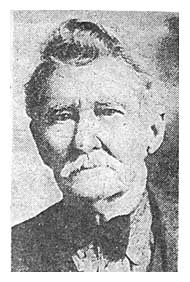<< RETURN TO THE GALLERY INDEX
Martin Van Buren Rainwater
 Martin Van Buren Rainwater was born in Arkansas in 1855 to Matthew Rainwater and Mahala Snapp, one of twelve children
born to this couple. He was named for the 8th president of the United States, a Jacksonian Democrat, which may shed
some light on his parents political leanings. He married his wife, Fannie Mayberry Wright, in 1879. The couple’s
first daughter, Nettie, was born in Arkansas in 1880. By 1900, the couple had eight additional children, recorded
in the 1900 census of Bell Co., Texas. These were: Hattie, 1883; Lillie, 1886; Daniel, 1890; Mattie, 1892;
Alva, 1894; Florence, 1896; Haley, 1898; and Orpha, born in April 1900. Martin is listed in this census as a
blacksmith. By 1910, the couple had lost one child, Orpha, and gained one, George, born ca 1903. Fannie died
in 1933, Martin in 1944. The couple is buried in Fisher Cemetery, Gregg Co., Texas.
Martin Van Buren Rainwater was born in Arkansas in 1855 to Matthew Rainwater and Mahala Snapp, one of twelve children
born to this couple. He was named for the 8th president of the United States, a Jacksonian Democrat, which may shed
some light on his parents political leanings. He married his wife, Fannie Mayberry Wright, in 1879. The couple’s
first daughter, Nettie, was born in Arkansas in 1880. By 1900, the couple had eight additional children, recorded
in the 1900 census of Bell Co., Texas. These were: Hattie, 1883; Lillie, 1886; Daniel, 1890; Mattie, 1892;
Alva, 1894; Florence, 1896; Haley, 1898; and Orpha, born in April 1900. Martin is listed in this census as a
blacksmith. By 1910, the couple had lost one child, Orpha, and gained one, George, born ca 1903. Fannie died
in 1933, Martin in 1944. The couple is buried in Fisher Cemetery, Gregg Co., Texas.
In 1935, Martin told the story of his pioneer experiences to a Fort Worth Star Telegram reporter, resulting in this article entitled "Pioneer recalls trip across Oklahoma without firearms".
One of the newest members of The Star-Telegram West Texas Pioneer Association, Martin Van Buren Rainwater, 80, of 3918 Avenue H, can recall when cannon balls were shot at him during the Civil War.
In 1874 he rode from Fayetteville, Ark., to Pauls Valley, Okla., on horseback, passing through the territorial village of Muskogee, where he paused only long enough to water his horse. Recently he returned to Muskogee for the first time in 61 years.
“There wasn’t any railroad there when I first visited that section,” he told the Pioneer Editor. “It took eight days to make the trip across Oklahoma. I slept in the open each night. The country abounded in wild game but I didn’t have a gun. I stopped at farm houses and trading posts for my meals. At Pauls Valley I went to work for a mercantile firm but later I moved to Texas.”
“When I was a boy of 11, I watched the Civil War battle at Prairie Grove, Ark. My home was just two miles from the battlefield. One day when I went to see a pony in a neighbor’s yard, some soldiers passed and later they began firing on us. We ran into the large log cabin. Two cannon balls were shot into the house.”
“Later the battle of Prairie Grove was fought. They dug double ditches around the field to bury the dead. Later they moved the bodies to Fayetteville.”
“I recall when three of my brothers joined the Confederate Army.1 ‘We’ll whip them in three days,’ they said as they rode off. But they didn’t come back for four years.”
“Soldiers would come to our house on horses. They would come into the house and ask about guns. One of the soldiers took my mother’s gun and broke it over a rock. The gun was an old flint lock rifle. The soldiers would go into the corn crib and fill their sacks. One time my mother tried to save her corn by throwing it out as fast as they would sack it, but finally they got away with it. They would shoot down hogs, taking only the hams.”
In 1880, Rainwater moved to Bell County and has since lived in Texas. He has made his home in Fort Worth for 10 years.
Credits
Article and photo supplied by Marcia Schutza. The article originally
appeared in the 27 Sept 1935 edition of The Fort Worth Star-Telegram.
View a copy of the original article.
Footnotes
1 Martin’s brothers John and Abraham served in the Union Army. Benjamin’s widow claimed
Confederate service for her husband, he is not carried on the roster of the Company in which he is
supposed to have served. William would simply have been too young. It appears, therefore, that Martin was either
confused when he says he three brothers served in the Confederate Army, or was tailoring his story for a Texas audience.
© 2018 Susan Chance-Rainwater
This work is licensed under a Creative Commons Attribution-NonCommercial-ShareAlike 4.0 International License

